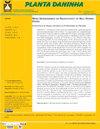Germination Ecology of Ivy-Leaved Morning-Glory: an Invasive Weed in Soybean Fields, Iran
IF 0.8
Q3 Agricultural and Biological Sciences
引用次数: 4
Abstract
ABSTRACT: Ivy-leaved morning-glory (Ipomoea hederacea Jacq.) is an exotic species that is becoming an increasing problem in soybean fields of Golestan province, Iran. Because little information is available on the biology of this weed species in Iran, experiments were conducted to investigate the effects of different factors on seed germination and emergence of Ivy-leaved morning-glory. Maximum germination occurred at constant temperature of 20 oC (82%) and alternating temperature of 15/25 oC (94%). Germination was reduced with increasing salinity and drought stresses. Sodium chloride concentration and osmotic potential that inhibited 50% maximum germination were -1.64 and -1.03 MPa, respectively. Acidity was a limiting factor for the germination, due to inhibiting effect of alkaline conditions on germination. However, the results showed that high temperature pretreatment >100 oC decreased seed germination. Germination decreased from 82 to 3% as temperature increased from 100 to 130 oC. There was no significant difference between seedling emergence in burial depths of 1 to 10 cm, but emergence reduced with increasing burial depth from 10 to 14 cm, and no seedling was emerged from a depth of 15 cm. The results of the flooding experiment also revealed that the seeds of this species are sensitive to this stress, so that emergence was 9% after 3 d flooding.常青藤叶牵牛花的萌发生态学:伊朗大豆田的一种入侵杂草
摘要:牵牛花(iomoea hederacea Jacq.)是一种外来种,在伊朗戈列斯坦省的大豆田日益严重。由于对牵牛花在伊朗的生物学研究资料很少,本文研究了不同因素对牵牛花种子萌发和出苗的影响。在恒温20℃(82%)和交变15/25℃(94%)条件下发芽率最高。随着盐度和干旱胁迫的增加,发芽率降低。抑制50%最大发芽的氯化钠浓度为-1.64 MPa,渗透电位为-1.03 MPa。由于碱性条件对发芽的抑制作用,酸度是限制发芽的因素。结果表明,高温预处理(bb0 ~ 100℃)降低了种子萌发率。当温度从100℃升高到130℃时,发芽率从82%下降到3%。埋深为1 ~ 10 cm时,出苗率差异不显著,埋深为10 ~ 14 cm时,出苗率随埋深的增加而降低,埋深为15 cm时无出苗率。淹水试验结果还表明,该树种种子对这种胁迫很敏感,淹水3 d后出苗率为9%。
本文章由计算机程序翻译,如有差异,请以英文原文为准。
求助全文
约1分钟内获得全文
求助全文
来源期刊

Planta Daninha
Agricultural and Biological Sciences-Plant Science
自引率
0.00%
发文量
0
审稿时长
16 weeks
期刊介绍:
Planta Daninha is a scientific journal published by the Brazilian Society of Weed Science (SBCPD - Sociedade Brasileira da Ciência das Plantas Daninhas). Papers submitted for publication must be sent through an electronic system, on http://www.scielo.br/pd. Works may be written in Portuguese, English, or Spanish, and will be accepted after being reviewed and approved by the Editorial Board. Only papers that have not been published or submitted for publication in other media will be accepted. Articles in Portuguese will be translated to English after being properly corrected and authorized by the authors. Planta Daninha has with goal to publish genuine technical-scientific papers and literature reviews from a critical perspective on Biology, weed management, and related topics.
 求助内容:
求助内容: 应助结果提醒方式:
应助结果提醒方式:


